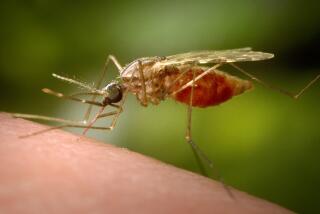Shortfalls in Africa’s Battle on Malaria
- Share via
NAIROBI, Kenya — As African countries decide how to fight a resurgence of malaria, many are switching to drugs that are largely ineffective, a report by the aid group Doctors Without Borders warned Wednesday.
“We feel like we’re watching a train wreck,” Daniel Berman, an official with the Paris-based group, told a news conference here.
Malaria is the leading killer in many sub-Saharan countries, with children accounting for 90% of the estimated 1.8 million deaths each year. Across the continent, public health experts are debating how to replace chloroquine, to which the malaria parasite has become resistant.
Bowing to cost pressures, several African countries have switched to cheaper alternative drugs even though research has shown that they are no more effective than the drugs they’re replacing.
The report by Doctors Without Borders, which is meant to help guide African countries in their malaria policies, said the most effective treatment should include artemisinin. The drug, an ancient Chinese remedy, is derived from the wormwood plant.
Donors’ Help Needed
The report’s author, Dr. Jean-Marie Kindermans, said artemisinin derivatives have been used successfully for malaria in Asia for more than a decade. They are fast-acting and work well with other combinations of drugs, and no resistance has yet been reported, he said.
The cost of the drug is prohibitive for most African countries, which rely on international donors for money to buy medicines. An adult dose of artemisinin costs $1.30, compared with 25 cents for a dose of a less effective treatment.
But Kindermans said switching to artemisinin is affordable if donors are willing to help. He said it would cost $19 million to prescribe the more effective artemisinin combinations in five East African countries: Kenya, Rwanda, Burundi, Uganda and Tanzania.
Several African countries recently abandoned chloroquine, which was developed by Germans in the 1930s, after realizing that the drug was ineffective in up to 80% of malaria cases. But the newer drugs, sold under the brand name Fansidar, did not fare much better, the report said. In Uganda, they have proved to be ineffective for 60% of malaria patients, it said.
“Knowing more effective drugs are available and not being able to give them to my patient has been so difficult,” said Diane Cheynier, a physician at a Doctors Without Borders clinic in Burundi. “Treatment exists that can avoid people dying unnecessarily. With the help of donors, African governments can avoid the fatal error of going to stopgap, Band-Aid solutions.”
Disease’s Toll Increases
As the disease’s resistance to drugs has increased, deaths from malaria have soared across Africa. Nearly half of Burundi’s 6.5 million people contracted the disease in an epidemic that broke out a little more than a year ago, killing thousands of people. In Tanzania, malaria accounts for 300,000 deaths a year, according to government figures.
Berman said the World Health Organization and the U.S. Agency for International Development, which help African governments fight malaria, had not done enough to promote the more effective Chinese treatment.
A U.S. official said Wednesday that the United States was “in the mainstream” with its approach of supporting the current malaria treatment policies of African governments.
WHO officials could not be reached for comment. But Tuesday, a day before Doctors Without Borders released its report, the U.N. agency posted a statement on its Web site recommending use of the Chinese remedy in Africa.
More to Read
Sign up for Essential California
The most important California stories and recommendations in your inbox every morning.
You may occasionally receive promotional content from the Los Angeles Times.













